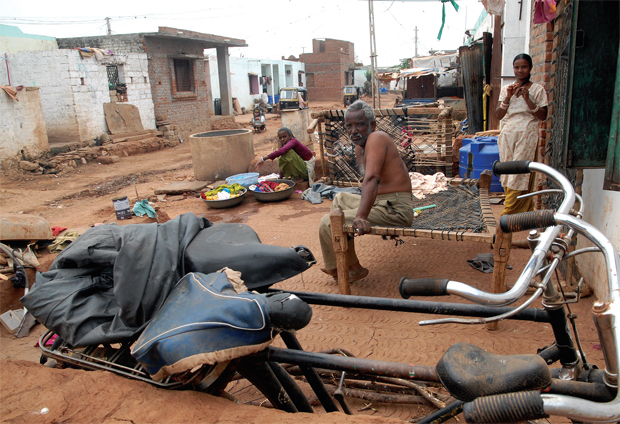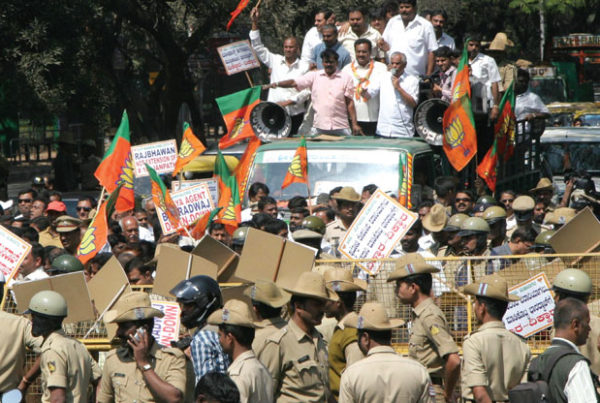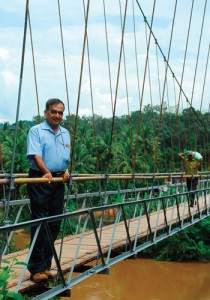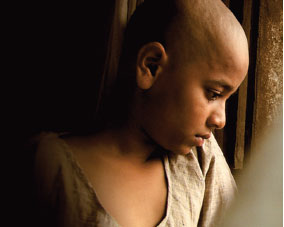As the State turns a blind eye, Muslim religious groups harass Gujarat riot victims forcing them towards conservatism. Sanjana Chappalli reports Photographs by S Radhakrishna
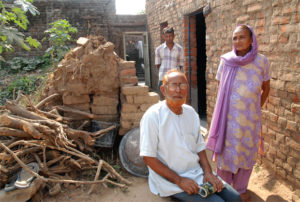
Rubble: Forced out of the colony, Mohammed Dewan returns to the home his neighbours razed in 2002
“FEAR”, SAYS Idrish Ismailbhai Vohra, “is a constant. In Gujarat, for Muslims, there is no escape.” After a pause, the 36-year-old tailor mulls over a possible escape route, “My family and I can commit suicide.” His 10-year-old son, who has travelled with him, looks up but says nothing. The boy’s silence and Vohra’s despondence fill the air. A week after Vohra speaks to TEHELKA, he is attacked in the dead of night by a group of people. Struck on the head with such force that he has to spend a week in hospital for constant nausea and frequent loss of memory. Threats to his life continue even after he is discharged. Lack of support has prevented him from filing a police complaint, he says. The only thing he could think of doing was to stay at home and send his two children to a relative’s house.
Idrish’s fears of being persecuted for speaking out are not unfounded. A month earlier, Abdulbhai Pathan was thrown out of his home in Tankaria relief colony because he spoke out against harassment. He now refuses to answer any questions from the press.
HOUSES OF THOSE WHO LEFT ONE COLONY WERE ALLOTTED WITHIN HOURS TO JAMAATI FAMILIES
Pathan and Vohra are among several Muslims facing severe harassment in the 81 relief colonies that came up in the aftermath of the riots that left approximately 3,000 Muslims dead and lakhs of people homeless across Gujarat in 2002. Unlike the violence then, the persecution now flows from a strikingly different quarter. Many Muslims that TEHELKA spoke to allege that Muslims belonging to the Tablighi Jamaat — a movement that describes itself as an apolitical organisation committed to the reform of Muslims — have made it impossible for them to lead a normal life, for the simple reason that these conservative elements control many relief camps where lakhs of riot-affected Muslims live in.
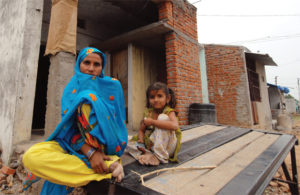
Weary Residents of Alliance-Siasat Nagar pooled money to start a normal school
Muslims cannot escape fear in Gujarat. Suicide seems to be the only route left for me and my family” IDRISH ISMAILBHAI VOHRA
Resident, Detral colony
These elements have not hesitated to lay down rules and restrictions that are at odds with local culture. Strict diktats have been issued for people to pray five times a day and that too, at specially designated mosques. Attendance and participation at religious discussions held in three-day camps is compulsory. No television sets are allowed and no music can be played on radios. All residents of relief colonies are forced to follow these rules. Additionally, Muslim men are asked to wear skullcaps and sport beards while women are encouraged to don the hijab and observe purdah. Residents who do not adhere to these norms are either issued warning notices or asked to vacate their houses – often in the middle of the night.
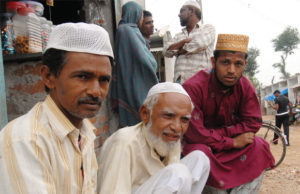
Framed? Sheikh Mahmoodbhai was arrested for allegedly assaulting a Jamaati maulana
When TEHELKA visited the Detral colony, the climate of fear that Vohra spoke of was palpable. Inside the colony, fearing exposure and consequent eviction, residents refused conversations, suggesting, instead that representatives of Muslim Relief Organisation (MRO), the trust that had established the colony, be contacted. Though the organisation itself is not associated with the Tablighi Jamaat, the MRO’s main representative, Basheer Ahmed Dawood, is a committed Jamaati by his own admission. Ask him about the diktats and there is no denial. Explanations, instead, are proffered. This is Islamic practice and Muslims would do well to abide by these rules, he says. Ask about the compulsory enforcement of the diktats and the harassment and he states that residents complain without reason. “The houses have been built through donations or zakat. If people can afford television sets, they don’t need the support that our organisation extends,” he says. Attempts to detail the lack of state support for survivors of the 2002 violence are fruitless. The fact that used television sets, for example, are available in local markets for less than Rs 1,000 are brushed off and the interview is brought to an abrupt halt. Understandably, these rules have not gone down well with large sections of residents. In Detral colony, where the Vohras continue to live, most survivors of the 2002 violence have chosen to move away. Of the 48 houses in the colony, only five families affected by the 2002 violence are left behind. Says 71-year-old Mohammed Shah Dewan, a retired schoolteacher and one of the first residents of the colony, “All of us left because we were unable to bear the harassment that was meted out. Within hours, our houses were allotted to families with members in the Tablighi Jamaat movement. Often, the new families moved in even before we were able to take away furniture stored at the neighbours’ houses.” Dewan, today, has been forced to return to his village and live amidst the people who destroyed his house in 2002. The climate of fear that marked his life in the colony has only replicated itself in the village.
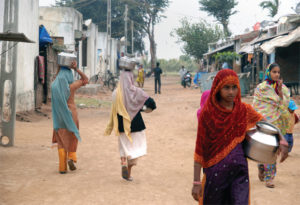
Hard-fought: After the battle against the conservatives,residents are left seeking the most basic of amenities
IN THE five districts that TEHELKA visited — Bharuch, Anand, Panchmahals, Sabarkantha and Vadodara — the stories of harassment varied only slightly. In Alliance-Siasat Nagar relief colony near Modasa in Sabarkantha district, the conflict took a serious turn. Unable to bear the constant impositions and interference of Jamaat leaders when it came to educating their children, the residents of 110 houses in the colony set out on their own path. They hired a schoolteacher to take classes for children in the colony. “The Jamaat leaders insisted we send our children to the madrassas they operated within the colony. For a few months, we wanted to avoid conflict and went along. But madrasas impart only religious education. How will our children survive in today’s world?” asks 35-year-old Mumtaz Bano Mahboob. Within a week, the Jamaat filed cases against four colony residents: they were accused of beating up the maulana, a charge that infuriated the residents even more. “We withstood their diktats for two years, afraid that we would be thrown out of the colony with nowhere to go. If we wanted to beat him up, would we have waited these two years?” asks Sheikh Mahmoodbhai, one of the accused. A daily-wage worker, he says that the residents collected Rs 5,000 to bribe the police to drop the charges. That was in 2008. Since then, none of the Jamaat leaders have returned to the colony.
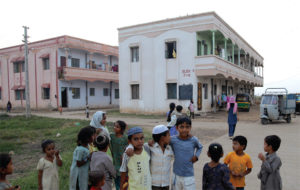
No simple answers: The only residents of Detral colony in Bharuch who were willing to talk
HOW DOES the Tablighi Jamaat operate in the relief colonies? In Gujarat, as in other parts of India, the movement works closely with the Jamiat Ulema-i-Hind – an organisation aligned with the conservative Darul- Uloom seminary in Deoband, Uttar Pradesh. The Jamiat’s many relief colonies in Gujarat give the Tablighis an easy entrance into the colonies. In the colonies set up by the Islami Relief Committee, a social welfare organisation affiliated to the Jamaat-e-Islami, the Tablighi Jamaat is far less prevalent.
Yousuf Sheikh is the head of Antarik Visthapit Haq Rakshak Samiti, an organization that has been working for the rights of those displaced in the 2002 riots. He minces few words when asked about the consequences of the Tablighi Jamaat spreading in the colonies. “They propagate an extremely conservative form of Islamic faith that is very alien to Gujarati Muslims,” he says.
A sizeable number of Muslims in Gujarat are descendants of Ahmed Raza Barelvi and owe their allegiance to the Barelvi sect, one that is known for its opposition to the more conservative Deobandi school propagated by the Jamaat.
“The fault lines between Hindus and Muslims have been drawn and continue to be re-drawn. Why do we need a Muslim organisation that discriminates against other Muslims? That too by enforcing a rigid conservative identity?” he asks. Tough questions for which leaders of the Tablighi Jamaat or the Jamiat Ulema-i- Hind have no answers.
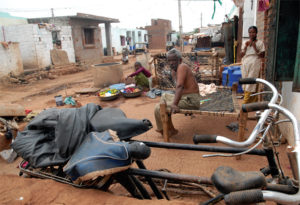 Rebel Base Unable to accept their diktats, residents of Kifayat Nagar ousted the Jamaat
Rebel Base Unable to accept their diktats, residents of Kifayat Nagar ousted the Jamaat
The Tablighi Jamaat members in the relief colonies repeatedly denied a strong organisational hierarchy, only saying that “there were no leaders associated with the movement since it was a loosely functioning group that discussed Islam and educated Muslims about the right path to follow.”
However, Afzal Memon, a prominent Tablighi Jamaat activist in Gujarat, was very forthcoming. “We are involved in the task of reforming Muslims. Unless we ourselves follow the right path, how can we talk about violence inflicted by others?” he said. All claims about the harassment of colony residents are staunchly denied. “There is no coercion by any member of the Tablighi Jamaat. These are rumours meant to defame us,” says Memon.
Muhammed Shah Madni, the Gujarat head of the Islami Relief Committee, an organisation that has established relief colonies in Gujarat admits to the conflict that exists between the conservative Tablighi Jamaat and others. “It has been brought to our notice repeatedly. The control that we can exercise in the matter is, however, limited. It is up to the people to organise themselves and make their choice known,” says Madni.
We are reformists. There is no coercion by any member of the Jamaat. These are rumours to defame us
AFZAL MEMON, Tablighi Jamaat member, Gujarat
Shabnam Hashmi, an activist who has spent the last 7 years working in Gujarat is not surprised at the situation in the relief colonies. “When the state disregards responsibilities towards its citizens, other organisations will step in to provide those services and dictate their own terms.”
In Gujarat, a state marked deeply by anti-Muslim prejudice, the harassment faced by residents of the relief colonies at the hands of the Tablighi Jamaat is disturbing.
Any paradigm that forces these citizens to choose between an apathetic state administration and an unrelenting, conservative religious organisation offers only a false choice. The overwhelming climate remains one of fear.
The great Muslim divide
Only a liberal dose of sanity will bridge it
BY Shabnam Hashmi (as told to Sanjana Chappalli)
Last week as we were working on a statement condemning the recent Jamait-ul-Ulema’s resolutions on women’s education and women’s reservations, a very senior journalist of a national daily argued that there were fringe elements within the organisation who slipped these in and that we were overreacting.
After the 2002 carnage, at almost every meeting that I walked into, whether in Gujarat or elsewhere, I found not only liberal, democratic Muslims but also many conservative sections. A close friend and activist had called up in 2003-2004 to say that the Jamiat-e-Islami was giving her an award for doing excellent work for communal harmony. During those years I perhaps fought almost single-handedly this tendency of embracing every kind and type of ‘the Muslim’ and declaring ‘him’ an ally in the struggle for democracy and secularism. I felt that the ‘secular Indian’ was washing its guilt of not being able to avert 2002 and, as a result, saw a secular person behind every Muslim name.
So the recent incident at the Relief Colony in Detral, Bharuch district did not surprise me at all. The Muslim Relief Organisation (MRO), UK had funded the construction of this colony after the carnage. There are a total of 72 colonies, according to our survey. Most of them have been built by various Muslim organisations and some by NGOs like Janvikas.
A number of families were forced out of the colony in Detral because they did not follow the MRO’s diktat. They were asked in writing not to play or keep radios and televisions in their houses. The local representative of the MRO who belongs to the Tablighi Jamaat also objected to their going to the village mosque and not to the madarsa built next to the colony – because the mosque in the village belonged to the dargah followers.
In many other colonies there have been instances of similar elements belonging to different conservative organisations objecting to women going out without burqa or working outside their homes.
Slowly, but very steadily, the conservative Muslim organisations are in the process of building inroads into the Gujarati Muslim community. The absence of a secular state and a sensitive civil society makes it easier for such organisations to dictate terms. From my limited experience of the past seven years I have found the Gujarati Muslim comparatively much less influenced by these conservative forces than their counterparts in many other northern states. I feel if immediate steps by the liberal, educated Muslim are not taken to confront these conservative organisations – not only in Gujarat but at the national level too – then we might end up in further marginalising the Muslim and dragging a large section of the community backwards.
On the other hand, within Gujarat where the state is constantly in the mode of witch-hunting the Muslim, it would jump at these opportunities to further discriminate their ‘second class citizens’.
This fear that the communal state will use this as an opportunity has been debated for the past few years, and civil society has to some extent been a party to ignoring the extent of this problem. A simple logic that the right ideology – regardless of its colour or religion – remains right will help in taking on these forces within the Muslim community.
Can we allow 2002 Gujarat victims to be dispossessed again of their only possession (a tiny 10×10 feet house) because they chose to play songs during Ramzan? Are we saying the Taliban has arrived?
We must recognise that the concepts of equality and justice have been developed in modern times and we cannot locate them in our combined heritage. The liberal, educated and democratic Muslim has to take charge and say we live in modern times, are answerable to our God and will not allow any mediators – not only for the sake of our own future generations, but also for the majority of the Muslim population of this country. For, though socially and economically the most backward, it has not so far given in to conservative ideas. The community is waiting for the liberal voices to counter this madness.
(Shabnam Hashmi is a rights activist associated with ANHAD)
Unyielding conditions
- Prayers to be said five times a day with specially appointed Maulanas, at designated mosques located inside relief colonies
- Attendance a must at three-day camps held once a month where discussions revolve around religion
- No television sets allowed in the house even if residents used them to watch news bulletins
- No music to be played on radios, computers or other devices
- Women encouraged to don the Hijab and observe Purdah
- Men encouraged to adopt Islamic garb – to wear skullcaps, sport beards an
—
This article was originally published in Tehelka, a leading independent news magazine in India, known for its investigative journalism.
